
Thirty-Third Sunday in Ordinary time -Year A
Gospel text : Matthew 25:14-30
vs.14 Jesus spoke this parable to his disciples:
“The kingdom of heaven is like a man on his way abroad who summoned his servants and entrusted his property to them.
vs.15 To one he gave five talents, to another two, to a third one, each in proportion to his ability. Then he set out.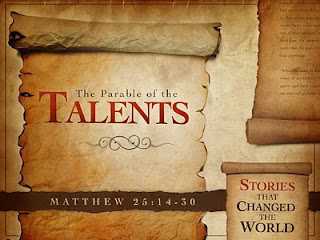
vs.16 The man who had received the five talents promptly went and traded with them and made five more.
vs.17The man who received two made two more in the same way.
vs.18 But the man who had received one went off and dug a hole in the ground and hid his master’s money.
vs.19 Now a long time after, the master of those servants came back and went through his accounts with them.
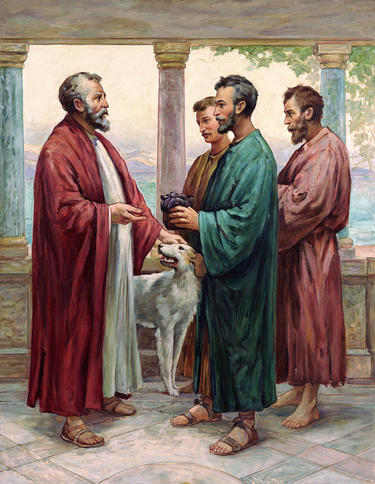 vs.20 The man who had received the five talents came forward bringing five more. ‘Sir,’ he said ‘you entrusted me with five talents; here are five more that I have made.’
vs.20 The man who had received the five talents came forward bringing five more. ‘Sir,’ he said ‘you entrusted me with five talents; here are five more that I have made.’
vs.21His master said to him, ‘Well done, good and faithful servant; you have shown you can be faithful in small things, I will trust you with greater; come and join in your master’s happiness.’
vs.22 Next the man with the two talents came forward.
‘Sir,’ he said ‘you entrusted me with two talents; here are two more that I have made.’
vs.23 His master said to him, ‘Well done, good and faithful servant; you have shown you can be faithful in small things, I will trust you with greater; come and join in your master’s happiness.’
vs.24 Last came forward the man who had the one talent. ‘Sir,’ he 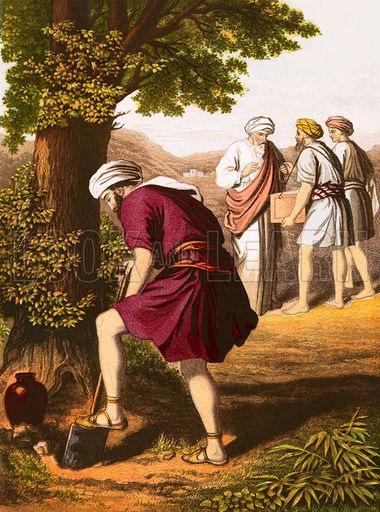 said ‘I had heard you were a hard man, reaping where you have not sown and gathering where you have not scattered;
said ‘I had heard you were a hard man, reaping where you have not sown and gathering where you have not scattered;
vs.25 so I was afraid, and I went off and hid your talent in the ground. Here it is; it was yours, you have it back.’
vs.26 But his master answered him, ‘You wicked and lazy servant! So you knew that I reap where I have not sown and gather where I have not scattered?
vs.27 Well then, you should have deposited my money with the bankers, and on my return I would have recovered my capital with interest.
vs.28 So now, take the talent from him and give it to the man who has the five talents.
vs.29 For to everyone who has will be given more, and he will have more than enough; but from the man who has not, even what he has will be taken away.
vs.30 As for this good-for-nothing servant, throw him out into the dark, where there will be weeping and grinding of teeth.'”
*******************************************************************
We have 4 commentators available from whom you may wish to choose. Scroll down to the required writer.
Michel DeVerteuil: Lectio Divina with the Sunday Gospels – Year A
Thomas O’Loughlin: Liturgical Resources for the year of Matthew
John Littleton : Journeying through the Year of Matthew
Donal Neary : Editor of the Messenger
****************************************
Michel DeVerteuil
Lectio Divina with the Sunday Gospels- Year A
www.columba.ie
General Comments
This Sunday’s passage continues last Sunday’s. It too is a long parable telling us “what the kingdom of heaven is like”, i.e. “what it is like” to experience grace coming into our world. Most people find this parable difficult because of the master’s seemingly exaggerated anger; also he is very hard on the third servant who was already less gifted than the others. If this is “what the kingdom of heaven is like”, then it is “bad news” indeed.
We must find an interpretation therefore which is both faithful to the text and also brings “the good news of the kingdom” to all, but in particular to the “little ones” (those with “only one talent”) of our communities.
The key to such an interpretation is to remember Jesus’ situation when he gave this teaching. As with last week’s passage, he was at the end of his public ministry, frustrated at the hardness of heart of the leaders of the people. The Mosaic tradition had taught generosity of spirit and compassion for the oppressed; the leaders had let this glorious tradition become their personal possession, an excuse for meanness and exclusiveness, a way of protecting their positions of privilege.
Jesus is highly indignant at what they have done with God’s gift – rightly so. We need to enter into his feelings. The God of the bible (Old and New Testament) is so passionately committed to the cause of the poor that when they are ill treated, “his anger flares“, as the first reading of the 31st Sunday reminded us. Nowadays we Christians tend to “soothe” God’s anger, whereas we should be asking for forgiveness that we are so passive (so lacking in anger) at the injustices of the world.
The “property” in the parable then, is not personal wealth. To interpret it like that makes the parable a teaching on being good capitalists! The master then becomes a go-ahead CEO angry that his company has not made the profit it should have. The “property” in the parable is God’s precious gift intended to multiply and be life-giving for all. Its true purpose is distorted by the servant’s meanness (this is why he is called “good-for-nothing”).
The parable then is gives us two messages.
– To those who have been made to feel excluded from the kingdom (“tax collectors and prostitutes”) Jesus brings the “good news” that this is totally against God’s will. In fact God is very angry that they are being excluded.
– To his disciples he issues a stern warning: do not fall prey to a similar narrow mindedness. The history of the Church (like our individual stories) tells us how right he was to warn them. We all fall into the trap of seeing our talents as our personal possession that we can do what we like with. God’s will is that we see them as gifts to be shared so that they can be multiplied.
We remember examples of something similar happening.
– The teaching of Jesus, so full of potential for transforming the world and yet so often “hidden under a bushel“. Christians have “dug a hole in the ground and buried it”.
– Nature, which God has made so bountiful, now becomes a matter for personal greed with the resultant scarcities.
– Family traditions of openness to all, allowed to degenerate into snobbishness and racism.
– Individual talents (physical, mental, spiritual) intended to be a blessing for families and societies, become things to be bought and sold. We celebrate the “Jesus person” who made us conscious of this betrayal.
The parable is not all negative. It shows another possibility – the first two servants, trusting and free spirited, and experiencing abundance. We celebrate people who have followed that path, communities too and social moments.
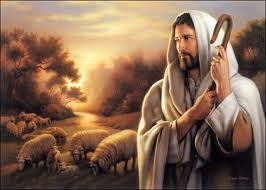
Jesus: our greatest talent.
The master is also someone we can celebrate.
He is the kind of leader who does not cling to power. He entrusts his “property” (his cause) to those who work with him without counting the risk.
This parable is crucial teaching for our modern Western culture which glorifies mistrust as not merely necessary but actually beneficial. This aberration has affected the way we Christians now tend to see Jesus – our first concern becomes to “protect” his message against our “competitors” notably the adherents of other religions. Our faith then makes us mean spirited and elitist – we are no longer life-giving for the world.
Verse 29 is a teaching found in other contexts, e.g. Matthew 13:12 and Luke 8:18. We are free to meditate on it by itself therefore. Here again, the saying seems unfair but if read creatively turns out to be a little gem of wisdom. This “thing” that when people “have it” they are “given more” whereas when people “don’t have it” even the little they have is “taken away”, is trust. People who have no trust in themselves, in others or in life, end up losing “even what they have”. On the contrary, people who have that kind of trust end up being “given more”.
The verse invites us to celebrate Jesus the teacher (and those who have played a similar role in our lives):
– he reassures those who trust that they are on the right track; there is not the slightest trace of cynicism in him, on the contrary his message is, “go ahead and trust”. How we need teachers and leaders like that!
– he issues a stern warning to those who have no faith. “Learn to believe in yourself”. Jesus doesn’t molly coddle people, as someone else put it “Get off your butt and stop pitying yourself! Otherwise you will lose everything you have.”
Scriptural Prayer Reflection
“If at times we are inclined to feel discouraged, let us not be dismayed. The human will remains the great force the Creator designed it to be.” … President Hassanali of Trinidad and Tobago, speaking to the nation after an attempted coup, July 1990
Lord, we thank you for the gift of free will.
It is this that enables us, even when we are discouraged,
to receive what life brings us, like servants being entrusted with a certain amount of talents by their master,
to go off promptly and make something of our opportunities,
and when the time for accounting comes, to come forward cheerfully and show what we have accomplished.
“If someone tells me that he doesn’t believe in God, I ask him to describe the God he doesn’t believe in, and I nearly always have to tell him that I do not believe in such a God either.” …….Lord Hailsham
Lord, forgive us Church people that we have given others a wrong impression of you.
Many have heard that you are a hard man, reaping where you have not sown and gathering where you have not scattered.
As a result, they are afraid, afraid to take risks, to trust themselves or to trust life. And so for the talents you have given them, they dig a big hole in the ground and hide them.
Humanity suffers, and so do they.
Lord, when we get into positions of authority we become afraid to trust people. Teach us to be like Jesus.
He walked the earth for some years, instructed his little community, then, when he had lived his appointed time, he entrusted his mission to his followers
giving each of us talents according to our ability;
then he set out on his journey back to you, knowing that he would return after a very long time and go through his accounts with us,
that even though some would hide their talents in the ground,
others would trade with them, and his word would multiply indefinitely.
Lord, a mark of our civilization is that everyone is afraid to fail. That is because we demand too much of one another.
We expect to reap where nothing has been sown,
and to gather where nothing was scattered.
Then people do not take risks and do not make of their talents what they could.
Lord, help us to face old age with trust in you and in ourselves,
knowing that you give us responsibilities
each one of us in proportion to our ability,
and once we are faithful in the small things you ask us to do,
you will trust us with greater things, and we will join in your happiness.
“Our deeds do not simply disappear into the black hole of time. They are recorded somewhere and judged.” ...President Havel of Czechoslovakia
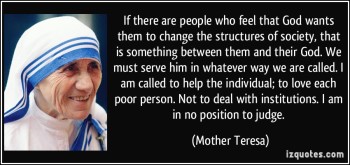 Lord, we thank you for those who keep alive in our society the idea of judgement, that you have entrusted your property to us,
Lord, we thank you for those who keep alive in our society the idea of judgement, that you have entrusted your property to us,
and you will come back to go through your accounts with us.
“We are not on earth as museum keepers,
but to cultivate a flourishing garden of life
and prepare a glorious future.” …Pope John XXIII
Lord, we thank you for good Pope John
and for all those who have made humanity more free,
urging us to see life in positive terms,
reminding us that the only thing which seems to make you angry is when we are afraid to use the talents you have entrusted to us
as if the world were ruled by a hard man who reaps where he has not sown and gathers where he has not scattered.
Lord, trust is the most precious of your gifts.
It is the kind of thing that when we have it we are given more
and end up having more than enough; but if we do not have it, then even the little we have is taken away.
We pray that we adults may hand on that gift to our children.
*********************************************************
Thomas O’Loughlin
Liturgical Resources for the Year of Matthew
www.columba.ie
Introduction to the Celebration
 Friends in Jesus Christ, we are all called to build the kingdom of God, but no two people have exactly the same task in this divine project which we call ‘creation‘. Each of us is called to bring God’s love, presence, light and peace into a particular world in which we are the centres. This is our vocation; this is the unique set of talents that has been entrusted to each of us by God. Today our thanksgiving focuses on these sets of talents that each of us has been given; and repentance is for those times when we as individuals have hidden our talents and failed to build the kingdom, and our prayer is that we will each follow our unique vocation more closely in future.
Friends in Jesus Christ, we are all called to build the kingdom of God, but no two people have exactly the same task in this divine project which we call ‘creation‘. Each of us is called to bring God’s love, presence, light and peace into a particular world in which we are the centres. This is our vocation; this is the unique set of talents that has been entrusted to each of us by God. Today our thanksgiving focuses on these sets of talents that each of us has been given; and repentance is for those times when we as individuals have hidden our talents and failed to build the kingdom, and our prayer is that we will each follow our unique vocation more closely in future.
Homily Notes
 1. ‘Vocation‘ is a word that always conjures up ‘churchy‘ images; we know somehow it belongs to the ‘sphere of religion rather than the world of ‘career choices’. We also know that it is a word that is intensely personal and individual: it affects me and my living of my life.
1. ‘Vocation‘ is a word that always conjures up ‘churchy‘ images; we know somehow it belongs to the ‘sphere of religion rather than the world of ‘career choices’. We also know that it is a word that is intensely personal and individual: it affects me and my living of my life.
2. However, many Christians – and this is true especially of Catholics – have become very confused (since the early nineteenth century) about what is referred to when we talk about the theology of vocation. For Catholics, in particular, it is ironic that the traditional theology of vocation has been retained for studies of Mary, but has been largely abandoned in practical spirituality. The problem is that ‘a religious vocation‘ has become almost identical to ‘ a vocation to be a religious‘; and, as a result, ‘vocation’ is now linked with having sufficient personnel for church offices. An example of this confusion is that recruiting men for the presbyterate is never referred to as ‘recruitment and training’ but is called ‘fostering vocations’. If a homily can try to break the link between ‘vocation’ and ecclesiastical offices, then it may have created a space where members of the community might be able to reflect on their individual vocations – remembering that each person’s vocation is unique.
3. When we speak of bishops or priests or deacons (or any other ministry) we are essentially speaking of people the community (not just this community but every local church) needs if it is to live its corporate life within Christ. One must have someone who has oversight of the practice of being disciples, one must have those who preside over the Eucharist, and one must have those who assist the community in various defined ways. These are publicly recognisable tasks and so common roles within the community. But a vocation relates to each person in the world, however small or large it is, at which that person is the centre. It could be the need to care for a sick relative. It might be that someone is the only person who can mediate and act as reconciler between those in a family dispute. It might be the need to bear witness to the demands of acting ethically in a boardroom meeting. It might be that someone has to put his/her comfort on hold as he / she is the only person who can provide a service to the community such as clearing blocked drains on a miserable day or it might be learning to sing a difficult psalm for the liturgy. It might be a parent teaching a child to know our prayers. It might be giving resources (money, time, skill) to some project that advances the kingdom of peace. Vocation is about the call each of us has to build the kingdom in that precise part of the whole creation where we are located.
 4. A vocation is common to all the baptised, but what it calls on us to do is different for each of us: in the gospel no two people got the same number of talents. We all must build the kingdom, but the demands that commission makes are never the same for any two individuals. Church ministries are essentially similar – this is the very presupposition of ordination; while vocations are essentially different as no two individuals occupy the same position in time / space, and within a set of relationships and skills, in the creation. This vocation is essentially religious: it involves God’s providence and our loving co-operation by which we move along our individual pilgrim’s path while at the same time the whole church moves along its pilgrim route as the People of God. This uniqueness of vocation is now almost exclusively only spoken of by Catholics in relation to the vocation of Mary; but each Christian’s vocation is similarly unique: only that individual can bring the kingdom of God into existence in her /his situation.
4. A vocation is common to all the baptised, but what it calls on us to do is different for each of us: in the gospel no two people got the same number of talents. We all must build the kingdom, but the demands that commission makes are never the same for any two individuals. Church ministries are essentially similar – this is the very presupposition of ordination; while vocations are essentially different as no two individuals occupy the same position in time / space, and within a set of relationships and skills, in the creation. This vocation is essentially religious: it involves God’s providence and our loving co-operation by which we move along our individual pilgrim’s path while at the same time the whole church moves along its pilgrim route as the People of God. This uniqueness of vocation is now almost exclusively only spoken of by Catholics in relation to the vocation of Mary; but each Christian’s vocation is similarly unique: only that individual can bring the kingdom of God into existence in her /his situation.
5. Obviously there are overlaps between ministries and vocations: there are some whose vocation includes a formal ministry; but even then the way that ministry is used for the glory of God will be individual to the person, his strengths and weaknesses, his skills and native genius, the place, the culture, the time, and the assortment of people who make up the community in which he uses his ministry. But if when you hear the word ‘vocation’ you think of someone wearing religious garb: then you have a problem in your understanding of what it is to be a Christian!
6. Here are a few slogans that can help clarify the situation:
(i) A religious vocation is not the same as a vocation to be a religious.
(ii) Ministerial tasks are common to many people; vocations are unique to individuals.
(iii) Ministerial tasks are visible to the group; a vocation is only visible to the individual.
(iv) All Christians have a vocation; only some will be given ministerial tasks.
(v) All have received talents; only you know what they are and how best to use them.
****************************************************************
John Litteton
Journeying through the Year of Matthew
www.Columba.ie
Gospel Reflection
What type of people are we? Would we describe ourselves as predominantly adventurous or overly cautious? How creative are we with the talents that God has given us? These are relevant questions to ask when determining whether or not we use and develop God’s many and varied gifts.

An Italian Ursuline sister, wins a national singing competition : Sr Cristina Scuccia
The parable of the talents has universal application. It is a parable for all people and for all times. It teaches us much about human nature and the numerous types of people in our world and in our Church. In particular, it invites us to reach our full human potential by using creatively the gifts with which God has blessed us.
Our various talents are an expression of God’s love for us as, indeed, is life itself, which is the greatest of all God’s gifts. As expressions of God’s love, our talents are not intended to be hidden or to remain unused. Rather, they are meant to be developed by us as a sign that we appreciate God’s love and blessing.
God does not give us talents just for ourselves. Our strengths and talents are best used for the good of other people and for the good of the Church. This is how we honour and glorify God. Unfortunately, many of us may hide our talents or, even worse, we may waste them by using them in useless and often sinful ways.
For example, we may know that we are effective communicators. Yet we choose not to use our gift of communication to convey the teachings of the gospel and the Church because we do not want to be unpopular. We prefer to remain undisturbed. Nevertheless, if we took a risk and communicated the truth we might bring another person consolation and happiness. Ultimately we might be God’s instrument in guiding that person to salvation.
Similarly, we may have been blessed with gifts of listening and patience. But if we do not use these talents to bring peace and harmony to troubled relationships around us, we are wasting God’s wonderful gifts.
Occasionally, we think that other people are more talented than we are and we envy them. Or we observe people ignoring and wasting their obvious strengths and talents — strengths and talents that we do not have — and we are moved to self-pity. We always remember, however, that God has blessed each one of us with a unique combination of gifts and talents that he expects us to use and develop. These talents vary considerably and we do not all receive the same gifts and strengths, either in kind or in abundance.
 The invitation is to trust God by using and developing our talents and strengths to the best of our ability. Thus our personal talents complement the talents that other people lack and we enable them to share with us the strengths that we lack. In effect, by refusing to be creative and generous, we cause our talents to die. By using them well we demonstrate that we are faithful and trustworthy.
The invitation is to trust God by using and developing our talents and strengths to the best of our ability. Thus our personal talents complement the talents that other people lack and we enable them to share with us the strengths that we lack. In effect, by refusing to be creative and generous, we cause our talents to die. By using them well we demonstrate that we are faithful and trustworthy.
What type of people are we? Do we use our talents creatively or do we hide them? The challenge of the parable of the talents is to recognise our God-given talents and strengths so that we can use and develop them as we help to build the kingdom of God in our world.
For meditation
You have shown you can be faithful in small things. I will trust you with greater; come and join in your master’s happiness. (Mt 25:21)
*******************************************
Donal Neary
Gospel Reflections For Sundays Year A
www.messenger.ie
Well Done !
Why did he hide the money? Maybe he was asked to be dishonest – to use the money for purposes that diddled others. At the time of this parable most money was made dishonestly. Today this could be like trafficking in drugs or sex, treating our migrant workers badly, paying off violence or buying in a way that diminishes others. The servant was an honest man and suffered for it.
 Did you ever feel you were being compromised by being asked to do something that you knew was wrong? A person pressured into watching internet porn, or engaging in sexual activity, or trying out alcohol? They may feel they will suffer in the future if they don’t give in.
Did you ever feel you were being compromised by being asked to do something that you knew was wrong? A person pressured into watching internet porn, or engaging in sexual activity, or trying out alcohol? They may feel they will suffer in the future if they don’t give in.
‘The godfathers’ of crime and drugs and violence have a lot to answer for. They are those that make money at the expense of others. This is one way of reading this parable: that people try to get other people to do their dirty work, and they can punish for not doing it.
The man in the end got thrown out by the greedy master – but from God he will, ‘Well done, come and inherit the kingdom.’
Today we are encouraged by the man who would not do the dirty work for anyone, would not take part in schemes that damaged others, and is the one who really ‘did well.’
Can you imagine when you or someone
you know went ‘against the tide?’
Imagine Jesus saying to you, well done.
What might it be for?
Lord, may I be faithful to you always
*******************************************************